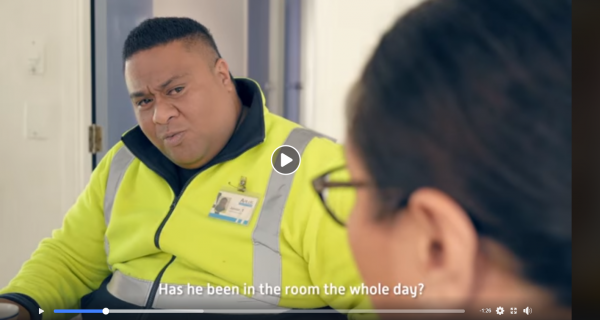Community-led and focused
In June, Vaka Tautua helped to launch a Pasifika-focused-and-led project to reduce mental distress prejudice and discrimination.
The Like Minds, Like Mine Pacific Approach Project was collectively created by a host of Pasifika non-governmental and community organisations. Hon. Jenny Salesa formally launched its resources.
“Each organisation recognised that we could achieve greater reach and value together,” Kristina Sofele, the project’s lead at Vaka Tautua says.
“The project was led by us, but it was very much a community process.”
Just Ask, Just Listen
Using Like Minds, Like Mine’s Just Ask, Just Listen messaging, the project featured a video, media guidelines for Pasifika radio stations and a series of community workshops held in Auckland.
The video tells the story of a Pasifika family’s mental distress and encourages Pasifika parents, caregivers and other adults to empathise with young people in distress. Presented in community workshops and on social media, the video advocates for the inclusion of family members throughout their toughest times.
“We know that one of the hardest places to share our mental distress is within our own families,” Kristina says.
“Some Pasifika families are predisposed to the idea that mental distress is caused by spiritual shortfalls which lead to the demonisation of a person, family or community. Often they feel the shame before recognising that their family member needs support.
“It’s part of the reason why Pasifika people in New Zealand present very late to services.”
Gathering insights
The project also held community workshops in Glen Innes, Kelston and Manukau, which helped people to start conversations about mental distress in their families. Key influencers from the church and community attended.
“A family we support were reluctant to receive help for one of their eight children, because they feared the prejudice and discrimination around their mental distress would be passed on to the rest of the siblings," Kristina shares.
“Another young man shared his lived experience story, saying 'I wonder what my life would have been like if my Dad had just supported me'. The emotional pull of his testimony was felt throughout the workshop and resonated with the rest of his family.
“The barriers in Pasifika communities are much broader than just a lack of access to mental health services. It involves someone’s status in their family and community.”
Talking to the media
Busting the myths around mental distress also meant changing the way it was talked about in the media. The Pacific Approach Project team adapted the Mental Health Foundation’s set of media guidelines and tailored them to Pasifika radio stations in a bid to change discriminatory language.
The revised guidelines were developed in continuous consultation with the Pacific Media Network and Radio Samoa staff and presenters.
“The work that we’ve been doing with radio stations has been really challenging, because we have to speak to our Samoan, Niuean, Cook Island and Tongan communities at the same time,” Kristina shares.
“We’re working to simplify the language that they use to get our anti-discrimination messaging across.”
The project also offered guidance on mental health helplines for callers and staff, and recommended that presenters de-brief after any distressing calls on-air.
Next steps
What’s next for the Pacific Approach Project?
“We’re recreating our community workshops and training our peers in anti-discrimination messaging.
Follow us to see our next steps!”

